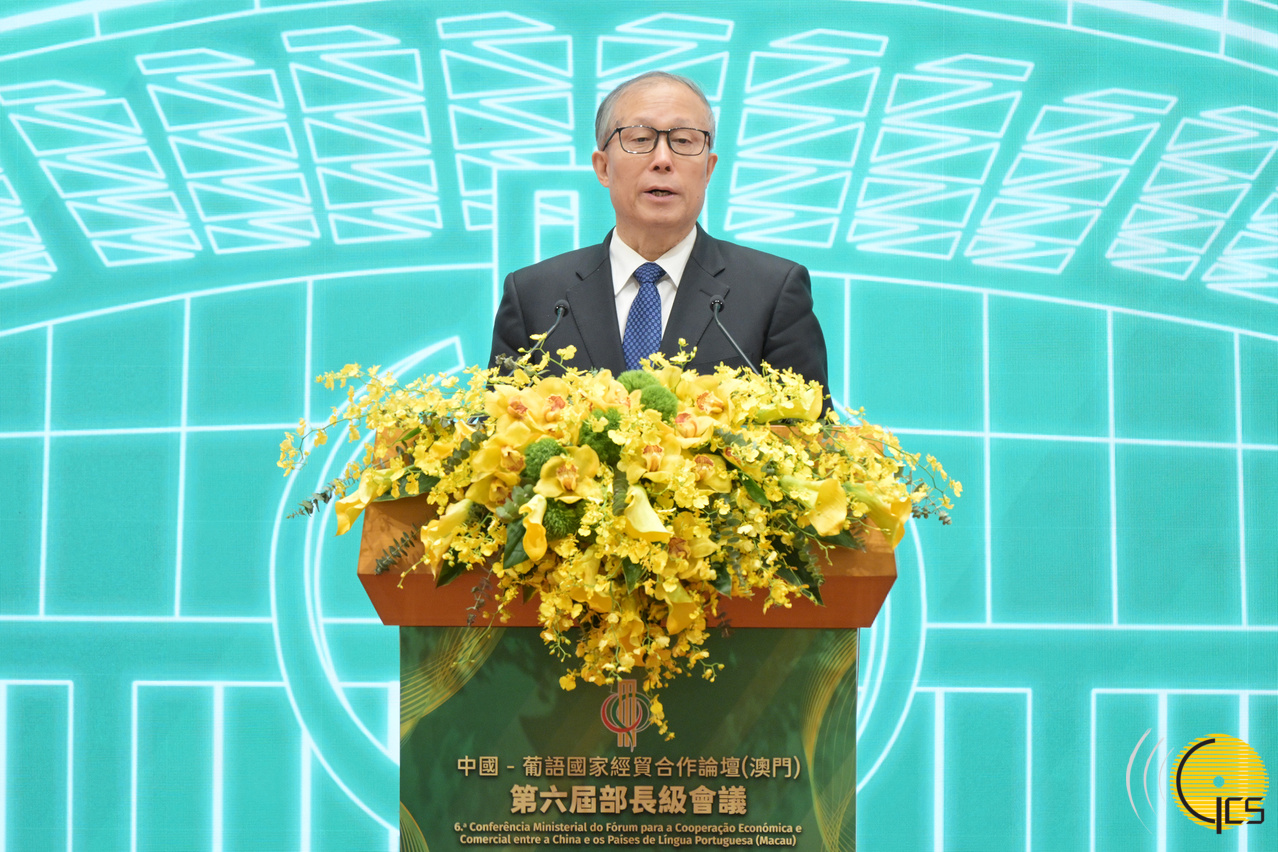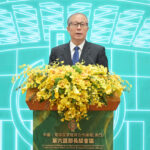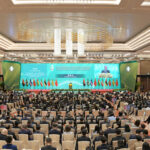 Member of the Political Bureau of the Central Committee of the Communist Party of China, and Vice Chairman of the Standing Committee of the National People's Congress of the People’s Republic of China, Mr Li Hongzhong, delivers a speech at the opening ceremony of the 6th Ministerial Conference of the Forum for Economic and Trade Co-operation between China and Portuguese-speaking Countries (Macao).
Member of the Political Bureau of the Central Committee of the Communist Party of China, and Vice Chairman of the Standing Committee of the National People's Congress of the People’s Republic of China, Mr Li Hongzhong, delivers a speech at the opening ceremony of the 6th Ministerial Conference of the Forum for Economic and Trade Co-operation between China and Portuguese-speaking Countries (Macao).
There will be 20 new initiatives covering six areas, to lift to new heights economic and trade cooperation between China and Portuguese-speaking countries.
The announcement of new measures was made today by member of the Political Bureau of the Central Committee of the Communist Party of China (CPC), and Vice Chairman of the Standing Committee of the National People’s Congress of the People's Republic of China, Mr Li Hongzhong, at the opening of the 6th Ministerial Conference of the Forum for Economic and Trade Co-operation between China and Portuguese-speaking Countries (Macao), the latter a body known as Forum Macao.
The opening ceremony of the 6th Ministerial Conference of Forum Macao was held at the China-Portuguese-speaking Countries Commercial and Trade Service Platform Complex in Macao.
Since its establishment, Forum Macao has witnessed an expansion of approximately 20 times in terms of trade between China and Portuguese-speaking countries; China has a position as one of the most important economic and trade partners for these nations. The scope of cooperation between China and Portuguese-speaking countries continues to expand, extending beyond economic and trade matters, to education, culture, healthcare, sports, tourism, and many other fields. Fresh highlights were emerging in terms of cooperation in areas such as poverty reduction, response to climate change, green development, and the blue economy.
The cooperation between China and Portuguese-speaking countries has become a paradigm of friendly collaboration among nations with differing social systems, cultural backgrounds, and stages of development, as well as varying sizes of territory, said Mr Li. It served as a vivid testament to the promotion of building a community with a view of a shared future for humanity.
China looked forward to working together with Portuguese-speaking countries to advance more broadly, in wider areas and to higher levels, cooperation between China and Portuguese-speaking countries. Such effort aimed – through robust impetus – to contribute to the construction of a closer community with a shared view of a future for humanity, injecting more certainty and positive energy into maintenance of global peace, stability, and sustainable prosperity.
The measures announced during the previous Ministerial Conferences had been realised. In the next phase, a series of new initiatives would be launched to further advance China-Portuguese-speaking countries’ economic and trade cooperation. These new initiatives will encompass six major areas.
1. Facilitation of cooperation in trade and investment. Efforts will be made to support enterprises in Portuguese-speaking countries to participate in major exhibitions such as the China International Import Expo. Export credit insurance will be provided to facilitate cooperation between Chinese enterprises and those from Portuguese-speaking countries .
Trade financing support will be offered to assist Chinese companies in expanding imports from Portuguese-speaking countries. Measures will be implemented to facilitate inspections and quarantine procedures for imported food and agricultural products from Portuguese-speaking countries. There will be enhanced exchanges on trade and investment policies, including the formulation of a China-Portuguese-speaking countries’ trade and investment guidebook.
2. Expansion of industrial cooperation. Assistance will be provided to Portuguese-speaking countries in enhancing their agricultural capabilities through the establishment or upgrading of “agricultural cooperation demonstration zones”. Joint scientific research projects will be carried out, and collaborative laboratories will be established. More air transport agreements will be signed with Portuguese-speaking countries, to facilitate closer personnel exchanges.
3. Strengthening of development cooperation. Assistance will be rendered, to the best extent possible, to the Portuguese-speaking countries in Asia and Africa. Support will be extended to interested Portuguese-speaking countries in Asia and Africa with regards to the formulation of economic development plans. Development aid funds will be coordinated to promote cooperation in agriculture, healthcare, culture, transportation, and infrastructure, with an aim to implement a number of small-scale and impactful livelihood projects.
4. Promotion of cooperation in human resources. An aggregate of 3,000 training opportunities will be provided to the Portuguese-speaking countries. Governmental scholarships will be offered to students from Portuguese-speaking countries to study in China. Support will be provided to the Macao Special Administrative Region Government in inviting personnel from Portuguese-speaking countries to engage in study tours and internships in Macao, particularly in the field of tourism.
5. Advancement of cooperation in healthcare. Collaboration with Portuguese-speaking countries will see pair-up hospitals in those countries. Short-term medical projects will also be initiated in Portuguese-speaking countries. Talented people from the field of traditional Chinese medicine will be trained for Portuguese-speaking countries, and overseas traditional Chinese medicine centres will be established in Portuguese-speaking countries where possible. A total of 300 medical assistance personnel will be dispatched to Portuguese-speaking countries in Asia and Africa.
6. Deepening in cooperation regarding Macao as a platform. Support will be provided to Macao in establishing itself as a financial services platform for China and Portuguese-speaking countries, including developing an international bond market denominated in currencies such as the renminbi and the pataca. Assistance will be extended to Macao to build a science and technology cooperation platform for China and Portuguese-speaking countries, prioritising the implementation of suitable projects. Support will be given to establishing a mechanism in Macao for audiovisual-sector cooperation between China and Portuguese-speaking countries, and for fostering multifaceted cooperation in this field.
Mr Li said China, as the world’s second-largest economy, is also a market with tremendous potential. Its economy is healthy, sustainable, and has strong prospects. China is committed to high-quality development, and actively building a new development paradigm. This will inject strong impetus into the global economic recovery and provide a broad market for countries including Portuguese-speaking countries.
China’s reforms will not come to a halt, nor its openness approach cease, said Mr Li. China will adhere to the fundamental state policy of opening-up and promoting broader, higher-level, and deeper cooperation and openness. China will continue to share the new opportunities brought by its development with countries around the world, including Portuguese-speaking countries.
Mr Li quoted an ancient Chinese proverb that says “When aspirations align, distance is no obstacle”. China and Portuguese-speaking countries share a friendship that transcends time and remains evergreen. They are partners moving towards each other, with their sights set on the future.
China is willing to uphold the spirit of win-win cooperation with Portuguese-speaking countries, insisting on openness, inclusiveness, and strengthening unity and mutual assistance; building together a community with a shared future for humankind and promoting China-Portuguese-speaking countries’ cooperation, said Mr Li.



